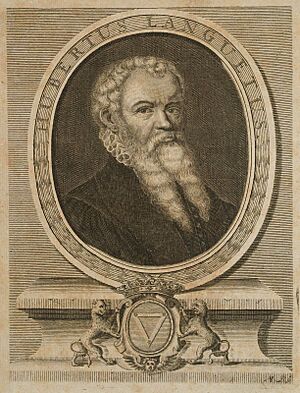Hubert Languet facts for kids
Hubert Languet (born in 1518, died September 30, 1581, in Antwerp) was an important French diplomat and a leader in the Protestant Reformation. He strongly believed in religious freedom and civil liberty. His main goal was to protect and expand Protestantism. He worked hard to bring Protestant churches together.
Contents
Hubert Languet's Life Story
Early Life and Education
Hubert Languet was born in 1518 in Vitteaux, France. This town is about 21 kilometers west of Dijon, France.
He started studying law at the University of Poitiers. But he was also very interested in other subjects. These included theology (the study of religion), history, science, and political science. He traveled to famous universities in Italy, like Padua and Bologna. He also visited Spain.
Becoming a Reformer
Languet was deeply influenced by a book called Loci theologici. This book was written by Melanchthon, a key figure in the Protestant movement. In 1549, Languet went to Wittenberg, Germany. Melanchthon welcomed him warmly. Languet often traveled with Melanchthon and became close friends with his circle.
Because Protestants were being persecuted in France, Languet settled in Wittenberg. He spent his winters there. But he also made many long journeys during the summer and autumn months.
A Diplomat for Saxony
In 1559, Melanchthon recommended Languet for a job. He became a diplomatic agent for the Elector of Saxony. He held this important position until 1577. The Elector sent him to many different royal courts. He traveled to Paris, Vienna, Prague, Frankfurt, Cologne, and the Netherlands.
Languet was a friend of Melanchthon. He disagreed with the growing group of strict Lutherans. Still, he tried his best to bring different groups together. He even tried to get the French Huguenots (French Protestants) recognized at a meeting in Frankfurt in 1562. However, he was not successful.
In May 1561, he went to France. His goal was to create a stronger connection between German princes and French Protestants. He attended the Religious Conference of Poissy. In 1562, he was in Antwerp. The next few years were spent traveling between France and Saxony for his diplomatic work.
Escape from Danger
In 1571, the Elector sent Languet to King Charles IX of France. He went with ambassadors from other Protestant princes in Germany. They were there to congratulate the King on the Peace of Saint-Germain-en-Laye. Languet argued for equal recognition of both Protestant and Catholic faiths.
However, the answer to this plea was the terrible St Bartholomew's Day massacre. Languet barely escaped with his life. He left France in October 1572. He only returned there one more time, shortly before he died.
From 1573 to 1576, he worked at the court of Emperor Maximilian II. He traveled with the Emperor on his journeys. When Maximilian II died in 1576, Languet's connection with the court ended. People at the court had strong negative feelings towards him. This was because he was a friend of Melanchthon and a Calvinist. So, he asked to leave the court. The Elector agreed and continued to pay his salary. In 1577, he moved to Cologne. He wanted to be closer to the Netherlands because he admired William of Orange greatly.
Hubert Languet's Important Writings
Hubert Languet is thought to be the author of a very important pamphlet. It was called Vindiciae contra tyrannos (which means "Defenses Against Tyrants"). This book was published in 1579. It is divided into four main parts. Each part asks and answers a big question:
- Should people obey God more than a ruler if there is a disagreement?
- Can a ruler be opposed if they break God's law and harm the Church?
- How far can people go to oppose a ruler who harms or destroys the state, and what rights do they have?
- Do neighboring rulers have the right to help people who are being treated badly by their own ruler?
 | Lonnie Johnson |
 | Granville Woods |
 | Lewis Howard Latimer |
 | James West |


